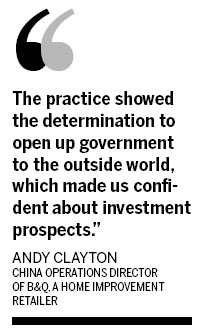Foreign guests get government reports in English at congress
Updated: 2012-02-08 09:54
By Zhou Wenting and Song Wenwei (China Daily)
|
|||||||||||

NANJING - Foreign guests invited to a session of the People's Congress of Jiangsu province this week will be given an English version of its government reports for the first time.
"It will be meaningless if foreigners attend the conference but cannot understand the Chinese language," Hao Risheng, director of the information office of the congress standing committee, said on Tuesday.
"The intention of inviting foreigners is to show transparency in government. In addition to Chinese residents, we want to share our working concepts and plans with foreign friends who work and make investments here."
The fifth session of the 11th Jiangsu People's Congress will be convened on Thursday in the provincial capital Nanjing, and 23 foreigners have been invited, including consular officers, representatives from the Jiangsu office of foreign governments, bosses of foreign businesses and scholars.
It is the second time that foreigners have been invited to observe the annual session, according to Huang Liqun, deputy secretary-general of the standing committee. He said the English report on the work of the government will now become routine.
Prior to Jiangsu, Shanghai and Shenzhen governments were the first on the mainland to hand out English copies of their reports to foreign guests attending as observers in 2004. Beijing adopted the practice the following year and won praise from foreign auditors and journalists.
"Previously we were very much confined to understanding the conference through reading Chinese material without being proficient in the language. The English report helped us a lot to see the developments of the municipality," said Mark Gooding, who attended the 2004 Shanghai session when he was the British consul general in the city.
"The practice showed the determination to open up government to the outside world, which made us confident about investment prospects," said Andy Clayton, China operations director of B&Q, a leading home improvement retailer, who was invited to the 2004 Shenzhen session.
Senior officials from these cities said they were aware that public services should not only be of high quality, but also committed to achieving international recognition.
Social experts applauded the translated reports, saying it made a change from an earlier attitude of seclusion.
"Some provincial or city governments reply to questions and queries from the outside world only when they are asked. Now they are taking the initiative to serve the community better by being more direct in communicating," said Yang Yayun, a professor at the Party School of the Central Committee of Communist Party of China.
Government is a key factor of a city's international competitiveness, she said, and it should not only help businesses and industries compete, but make them excel.
Xia Xueluan, a professor of sociology at Peking University, said the practice of providing English-translation reports should be adopted in other provinces and cities.
Related Stories
National People's Congress 2011-10-28 11:53
Foreign officials attend Hubei congress 2012-01-13 07:57
Beijing residents cast votes for people's congress 2011-11-08 11:05
GOP debt plan faces close vote in Congress 2011-07-29 07:50
- Capital flows moving in line with goals of policymakers
- Simpler visa procedures are passport to success
- Low-income housing distribution 'must be fair'
- China raises asoline and diesel prices
- Land sales forecast to earn lower revenue
- MOC: Exports still driving growth
- Passenger vehicle sales tumble in Jan
- China to see slow power consumption growth








